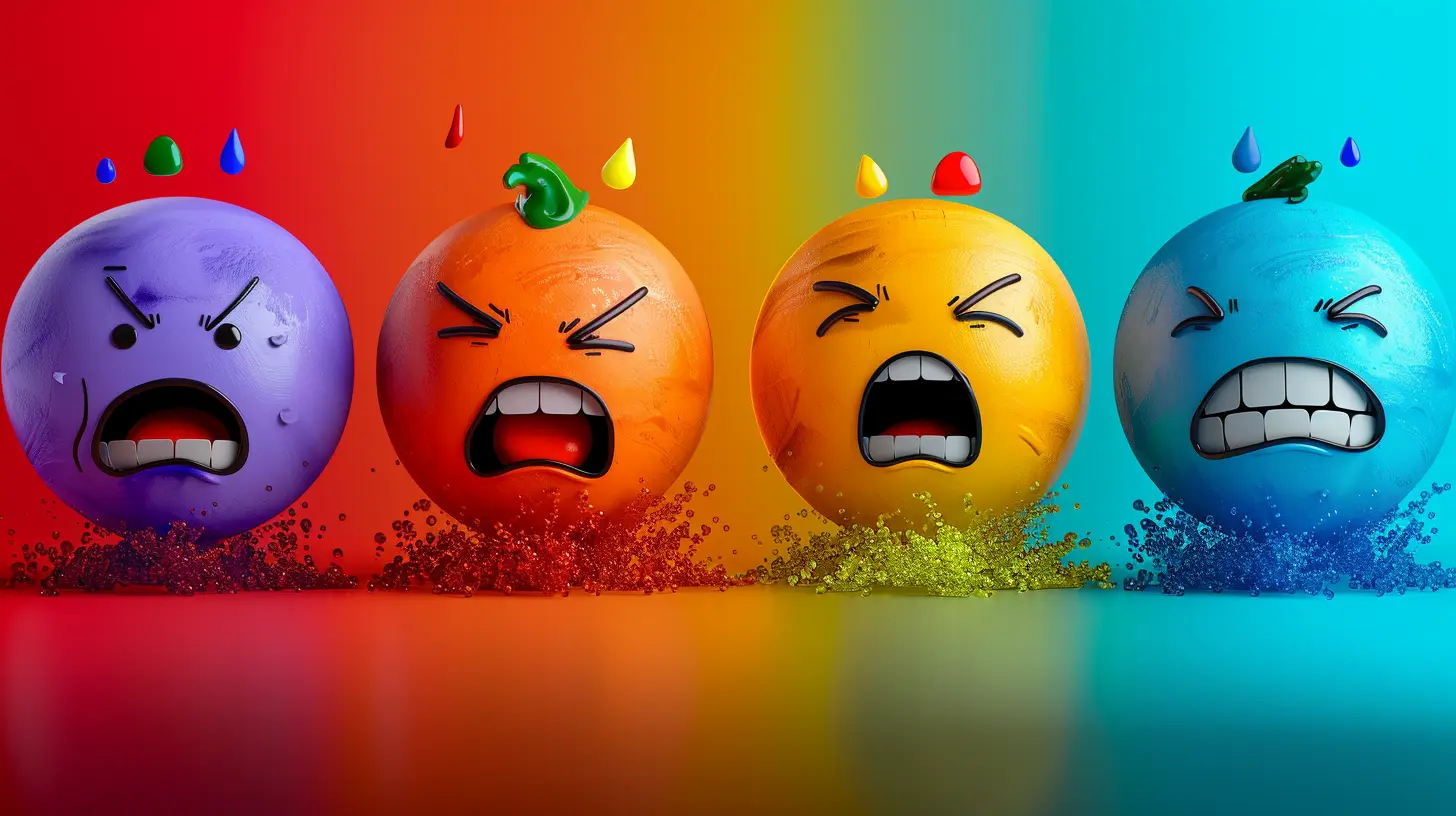The Science of Emotions: Understanding How We Feel
19 February 2025
Emotions — they can be messy and chaotic, but they're also a fundamental part of being human. Whether it’s joy, anger, sadness, or surprise, emotions color every aspect of our lives. But have you ever wondered what emotions really are, or how they work? Why do we feel the way we feel, and how does our brain process these complex reactions?
In this article, we're going to take a deep dive into the science of emotions, breaking them down and exploring why we feel the way we do. The human experience is full of emotional highs and lows, but understanding the science behind it all can give us a clearer picture of why emotions are so important to our survival and well-being. So, buckle up, because this is going to be an emotional ride (pun intended)!
What Are Emotions, Exactly?
Let’s start with the basics: What are emotions? Simply put, emotions are psychological and physiological responses to stimuli. They’re our brain's way of making sense of the world around us, helping us navigate social interactions, make decisions, and even stay alive. Think of emotions as your brain’s built-in alarm system — they alert you when something significant is happening, and they help you respond appropriately.But emotions aren’t just some abstract concept floating around in your head. They involve complex interactions between your brain, body, and even your environment. They’re not just "feelings" but involve physical reactions too — like your heart racing when you're scared or your face lighting up when you're happy.
The Three Components of Emotions
To understand emotions better, we can break them down into three components:1. Subjective Experience: This is the "feeling" part of the emotion. For example, how you feel when you're happy, sad, or angry. It’s entirely personal and subjective — no one can tell you how you're supposed to feel.
2. Physiological Response: When emotions kick in, your body reacts. This could be sweating, an increased heart rate, or even butterflies in your stomach. These are all signs that your autonomic nervous system is at work.
3. Behavioral Response: This is how you express your emotions. It could be a smile, a frown, or even a scream. These outward behaviors are how others can often tell what you're feeling, even if you don’t say a word.
The Neuroscience Behind Emotions
Emotions might feel like they come from the heart, but they’re actually all in your head. More specifically, they're the product of complex brain activity. The brain houses several regions that work together to process and regulate emotions. Let’s break it down:The Limbic System: The Emotional Hub
At the core of emotional processing is the limbic system, often referred to as the brain’s emotional center. This system includes several key players:- Amygdala: Often called the "fear center," the amygdala is responsible for processing emotions like fear and anger. It’s like the brain's smoke detector, always scanning for threats and triggering an emotional response when it detects one.
- Hypothalamus: This small but mighty part of the brain manages the body’s "fight or flight" response, regulating things like blood pressure, heart rate, and hormones when you're feeling stressed or scared.
- Hippocampus: The hippocampus is responsible for memory. It helps link emotions to personal memories, which is why you might feel happy when you smell your grandmother’s cookies or sad when you hear a song from a difficult time in your life.
The Prefrontal Cortex: The Rational Brain
While the limbic system is the emotional powerhouse, the prefrontal cortex plays a role in regulating those emotions. It’s the part of your brain that helps you weigh the consequences of your actions and make decisions based on logic rather than impulse. This is why, when you’re angry, you (hopefully) don’t immediately punch a wall. The prefrontal cortex steps in to say, "Hey, maybe that’s not such a great idea."
Why Do We Feel Emotions?
Okay, so we know where emotions come from, but why do we have them in the first place? Emotions serve several essential purposes in our lives, and they’re more than just fleeting feelings. Here are a few reasons why we experience emotions:1. Survival
At their most basic level, emotions help us survive. Fear alerts us to danger, so we can take action to protect ourselves. Love encourages us to form bonds and reproduce, ensuring the continuation of our species. Disgust helps us avoid things that might harm us, like spoiled food or dangerous environments.2. Decision Making
Whether we realize it or not, emotions play a huge role in decision-making. Sure, we like to believe we're logical creatures who make decisions based on facts and reason, but emotions often have the final say. For example, you may choose a career path not because it’s the most logical option but because it makes you happy. Emotions help assign value to different options, guiding us toward choices that align with our desires and values.3. Social Interaction
Humans are social creatures, and emotions are an essential part of how we communicate with one another. Smiles, tears, and even angry glares give others clues about how we're feeling, which helps build connections and navigate social situations. This is why emotional intelligence — the ability to understand and manage emotions — is so vital for healthy relationships.
Theories of Emotion: How Scientists Explain Feelings
Throughout history, scientists and psychologists have developed various theories to explain how emotions work. While there’s still no consensus on a single model, several prominent theories have shaped our understanding of emotions. Here are a few of the most well-known:1. James-Lange Theory
The James-Lange Theory suggests that emotions are the result of physiological responses to external stimuli. In other words, you don’t feel scared because you see a snake. Instead, you see the snake, your body responds (e.g., your heart races), and then you feel scared. The emotion is a byproduct of the physical reaction.2. Cannon-Bard Theory
The Cannon-Bard Theory challenges the James-Lange model by proposing that emotions and physiological responses occur simultaneously, not one after the other. According to this theory, when you see a snake, you feel fear and your heart races at the same time.3. Schachter-Singer Theory (Two-Factor Theory)
The Schachter-Singer Theory takes things a step further by suggesting that emotions are a combination of physiological arousal and cognitive interpretation. For instance, if your heart is racing, you might interpret that as fear if you're in a dangerous situation, or excitement if you're on a roller coaster.The Role of Hormones in Emotions
It’s not just your brain that’s responsible for emotions. Your body’s hormones play a crucial role too. When emotions are triggered, your endocrine system releases various hormones that affect how you feel. Here are a few key players:- Cortisol: Often referred to as the "stress hormone," cortisol is released when you're feeling anxious or stressed. While it’s helpful in short bursts, chronic stress can lead to an overload of cortisol, which can negatively impact your health and mood.
- Oxytocin: Known as the "love hormone," oxytocin is released during bonding activities like hugging, holding hands, or even petting a dog. It's associated with feelings of trust and connection.
- Dopamine: This is your brain’s "feel-good" chemical. It’s released when you experience pleasure, like eating your favorite food or achieving a goal.
- Serotonin: This hormone helps regulate mood, and imbalances in serotonin levels are often linked to depression and anxiety.
Can We Control Our Emotions?
While we can’t always control the initial emotional reactions we have, we can control how we respond to them. This is where emotional regulation comes in. Emotional regulation is the ability to manage and modify your emotions in healthy ways, rather than letting them control you.Here are a few tips for regulating your emotions:
- Practice mindfulness: Being aware of your emotions without judging them can help you manage them more effectively. Mindfulness techniques like meditation can be helpful here.
- Reappraisal: This involves changing how you think about a situation to alter its emotional impact. For example, instead of seeing a stressful situation as a threat, you might reframe it as a challenge you can overcome.
- Physical activity: Exercise releases endorphins, which can help improve your mood and reduce feelings of stress and anxiety.
The Emotional Spectrum: More Than Just Happy or Sad
Emotions are complex, and they come in a wide variety of flavors. Psychologists often categorize emotions into several basic types, but humans experience a much broader spectrum of feelings that can be difficult to define. Some psychologists, like Paul Ekman, suggest that there are six basic emotions: happiness, sadness, fear, anger, surprise, and disgust. However, others argue that emotions are more nuanced and can be mixed, creating a wide range of emotional experiences.For example, you might feel bittersweet — a combination of happiness and sadness — when you watch your child graduate from college. Or you may feel a mix of fear and excitement when starting a new job. Emotions are rarely one-dimensional, and that’s part of what makes them so fascinating.
Conclusion
Emotions are a fundamental part of what makes us human. They help us navigate the world, build relationships, and make decisions. By understanding the science behind emotions — from the brain regions involved to the hormones at play — we can gain better control over how we feel and respond to life's ups and downs.So, the next time you’re caught in a whirlwind of emotions, remember that there’s a science behind it all. Embrace the complexity of your feelings, and use them as a guide to better understand yourself and the world around you.
all images in this post were generated using AI tools
Category:
PsychologyAuthor:

Gloria McVicar
Discussion
rate this article
8 comments
Roman Carter
Emotions are like unruly toddlers—always throwing tantrums and demanding attention. Understanding them is key, but let’s be real: sometimes you just need to embrace the chaos instead of psychoanalyzing every tear. Feel it, flaunt it, and move on!
April 5, 2025 at 3:53 AM

Gloria McVicar
Absolutely! Embracing emotions can be liberating; sometimes, it's healthier to experience them fully rather than overanalyze. Thank you for sharing this perspective!
Cambria McNair
What a delightful dive into our emotions! 🌈 Understanding our feelings helps us navigate life's ups and downs. Remember, it's okay to feel—every emotion is a step on our unique journey. Keep shining! ✨
March 18, 2025 at 3:47 PM

Gloria McVicar
Thank you! I'm glad you enjoyed the exploration of emotions—embracing our feelings truly enriches our journey. 🌟
Arianth Love
This article beautifully captures the complexity of our emotions! It's fascinating how understanding our feelings can lead to better self-awareness and healthier relationships. Great read!
March 16, 2025 at 4:09 PM

Gloria McVicar
Thank you so much for your kind words! I'm glad you found the article insightful. Understanding our emotions is indeed key to personal growth and healthier connections.
Simon Sanders
Thank you for this insightful article! Your exploration of the complex interplay between emotions and our psychological well-being is thought-provoking. It's fascinating how understanding our emotions can lead to personal growth and healthier relationships. I look forward to reading more on this vital topic!
March 8, 2025 at 5:14 PM

Gloria McVicar
Thank you for your kind words! I'm glad you found the article insightful. I appreciate your interest in this important topic and look forward to sharing more in the future!
Zaren Phillips
Feeling your feelings? It's like being a human onion—peel back the layers for a good cry or a hearty laugh! Dive into the science of emotions and discover the quirks that make us beautifully complex! 🧅😊
March 8, 2025 at 5:20 AM

Gloria McVicar
Absolutely! Emotions are indeed complex layers that enrich our human experience. Exploring them can lead to profound insights and connections. 🧠💖
Soren McAllister
Great article! It's fascinating how our emotions shape our daily experiences. Understanding the science behind what we feel can really help us navigate life's ups and downs. I love how this piece breaks down complex concepts into relatable insights. Can’t wait to delve deeper into my own emotional landscape!
March 4, 2025 at 4:43 PM

Gloria McVicar
Thank you for your thoughtful feedback! I'm glad you found the article insightful and relatable. Exploring our emotional landscape is indeed a journey worth taking!
Tank Franco
Emotions are the language of the mind; understanding them unlocks deeper connections with ourselves and others.
March 2, 2025 at 5:33 AM

Gloria McVicar
Thank you! I completely agree—understanding our emotions enriches our connections and enhances self-awareness.
Bethany Coleman
Emotions are the silent architects of our behavior, sculpting our thoughts and actions in ways we're often unaware of. This article brilliantly decodes the intricate interplay between feelings and the human experience. A must-read!
February 23, 2025 at 6:02 PM

Gloria McVicar
Thank you! I'm glad you found the article insightful. Emotions truly do shape our experiences in profound ways.
MORE POSTS

The Impact of Nutrition on Your Motivation and Energy Levels

Emotional Dependency in Family Dynamics: Breaking the Cycle

How to Recognize the Signs of Emotional Dependency in Yourself

How Rewards and Consequences Shape Workplace Behavior

Exploring the Psychology of Identity and Self-Concept

How Emotional Dependency Is Linked to Codependency